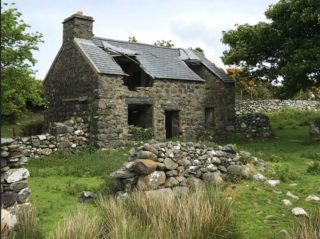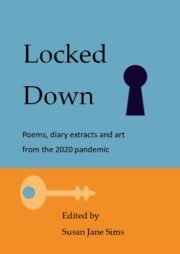
• Archive of all Poetry Space showcases
Guest editor: Stephen Lightbown
Featured photograph: Chris Sims

Stephen was born in Blackburn, Lancashire, and in 1996, aged 16, he experienced a life changing accident whilst sledging in the snow and is now paralysed from below the waist. In 2016, twenty years after the accident, he started writing poetry about his life as a wheelchair user.
Now living in Bristol, Stephen has since spoken at events across the UK and has been published in a range of magazines and online poetry websites. He writes with the aspiration of one day replicating the high he felt when he was first published, aged 11, in his school magazine.
He can be found on most social media channels via @spokeandpencil and in 2019 Stephen’s first poetry collection, Only Air, will be published by Burning Eye Books.
Fern
In a shadowed space,
in the lace of crisis-cross shade,
in the dark or dripping place,
they sprout
spring
spray
uncurl
unroll
unfurl.
They are shafts of rain grown intricate,
reversed, turned delicate,
grown so green & so ornate.
From under the rustle of brush & bush,
the crackle of branch stems & twigs,
something stirs,
flecked and feathered:
From the one frond: many
from the many: multiple and fractal,
from the multiple:
the more, yet more and more.
From walls they fall.
From peat they fountain:
grown lush in the plush of moss,
but bracken’s soon trampled, broken:
fern melting to stranded mud,
turning to new soil
in a shadowed place,
in a shadowed space.
Lizzie Ballagher
Medical History
Over my medical history the doctor goes
On this visit for something minor, as if he knows
Something about me, which of course he does.
It is encoded in the folded notes, the tests; it was
Building up over the years; the colds, viruses, those
Occasional fault-lines that , I suppose,
To a trained mind accumulate like pus
In a wound – my whole life a wound. And thus
I sit here trembling, wondering if it shows –
My medical history – the secret I am guilty of, whose
Consequences I now face in this rebellious
Attack of cells. Genetic? Environmental? Cause
And effect are lost in fifty years. Either way I lose.
Nothing to do but wait and see what he will diagnose.
Michael Docker
Midnight Street
It’s dark and silent,
I am alone, I shiver
In the empty echoing darkness of the night.
Thinking of the smell of you,
The touch of you, the taste of you.
Lost because I’m losing you, while walking through
The empty echoing darkness of the night.
It’s dark and silent,
I am alone with the unknown
In the empty echoing darkness of the night.
Joyce Walker
Dad’s Old Bureau
Reclining now by my wall
this sweet old wooden lady
standing there, ironic,
on her shapely wooden legs.
I can see Dad now,
Pondering over her leaf,
Pen in one hand –
Fag in the other!
Richard Baigent
Under the Sycamore (in memory of the Tolpuddle Martyrs)
They swear an oath that runs as deep
as sycamore roots, and just as stubborn:
six men starving, who would starve no more;
six men landless, who on others’ land would plough
no longer for that shameful seven- shilling wage –
still hearing their children weep for pity.
Above their heads, the sycamore
by now a century away from sapling days
bears witness, knows the suffering
that comes from bark-hardened certainty,
yet spreads a silent welcome to those who- under the cloud
of opening leafy stars – would dream.
But these Dorset men are not long for home
once the word gets out.
Betrayed, they travel manacled
to prison hulks in stinking docks;
endure a martyrdom – the lash, the wounds –
of bitter transportation.
No more was ailing with blackbirds in the cider apples
but sailing, sailing under salt-stung timbers,
sycamore branches now exchanged
for oaken beams in a ship’s dark hold,
their ploughs for iron shackles worn
many months at sea in foetid slavery.
Yet they, like long-lived sycamores, prevail.
As winds sweep off the reddening summer seeds
flying far and rooting wide,
the truth – the right – of all that they hold dear
eventually shines clear – even for cruel aristocrats:
for those reluctant listeners in Westminster.
“We will, we will, we will be free!”
The song rolls on
and others hear and see
as they return, as they are freed
with justice done
to live and spread their hopeful seed.
Lizzie Ballagher
The Tolpuddle Martyrs were six farm labourers who in the spring of 1834 made a vow under a
sycamore tree in Tolpuddle, Dorset, to fight the oppression of their masters. They were tramsported
for their troubles.
All the Magic of our unknowns
I knew hymns and heaven;
I knew hill top and ash;
I knew blackberry and wasteland;
I knew mud and footprints
I knew wound and slight:
the magic of the well known.
Years passed and the magic grew.
I knew the spell of resurrection space,
the gift of heaven’s time,
the call of the burning mountain side,
the speed of the battering storm,
the silence of the magic unkowns;
the known, the unkown,
the magical steps between,
I pause on today’s threshold,
on the steps of longing,
open, unclenched, ready,
eyeing the horizon’s promise,
waiting for the dawn
of tomorrow’s gift.
Judy Dinnen
Rituals
They’d buried her with dignity and care:
laid her on her side, curled, as if she were
asleep: placed by her things she had known,
cups, bronze bangles, amber beads; positioned
a branch of fallen antlers over her
in promise of new life. Required words
would have been uttered, gestures made, perhaps
crude music played. And then the chamber closed.
Carefully, with scientific rigour,
the archaeologists recorded their
observations, sifted the evidence,
dated the samples. The bones were measured,
analysed for signs of ageing, trauma
or disease; interpretations agreed.
A scholarly catalogue was published,
the finds placed in glass cases for display.
We queue and join the exhibition crowd,
study the obscure remnants of our past,
learn about the ancestors from old bones.
But there is something simpler to know:
they loved, they laughed, they quarrelled, they enjoyed
each other’s company as we do ours;
when one was gone they mourned her loss and, like
us, marked it with devotion, and in hope.
David Prior
Butterfly Hill
The sun was spinning a golden thread
On a loom of sky over Butterfly Hill
When we fed our kites to the boisterous wind
– Terry and Janet, Priscilla and me –
in the long long grass that tickled our knees
Or blew on a dandelion clock till time
Went off in a huff and the last plumed seed
Had led us a dance through the billowing flowers,
Hijacked a heather-scented breeze,
And was lost for good in the sky’s blue dust.
Terry and Janet, Priscilla and me-
We played till our shadows put on stilts
And the soft pink faraway lights came on
In the cabins of the clouds – but whose
Was the voice that called us away, away?
Old woman at the cottage door,
In gathering dusk beneath the hill –
Why do you stand so still, so still?
Oh never, never ask her name
as one by one she calls her children home.
Anthony Watts
Brother Slug
A slug came into my father’s garden,
lugging its vulnerable succulence
towards the cabbage patch-
a gentle vegan cruising for its lunch.
‘Brother Slug’, I said but would not touch him.
And when I brought the packet from the kitchen,
it was simply another day. I watched entranced
the slug’s one muscle writhing
in a thickening net of salt and slime –
the shapeless yellowing crust.
Anthony Watts
Mind the Gap
Through the carriage window
a sudden glimpse of rainbow
lifts the heart
travelling alongside
beyond the rolling fields
whilst the wide expanse of harbour
laps the rail edges
cocooned within
moving walls
passing through stations
gracefully Victorian
charming village halts
another journey east
to waiting rooms where hope
turns anxiety into knitting
or poetry
cutting edge medicine
nurtures a future
for me or someone else
Jo O’Farrell
( Jo sadly died in July after sending this poem. I am so glad Stephen chose it. Sue )
Editor’s feedback
Fern
I enjoyed reading this poem and how the words felt in my mouth as I read it aloud. I was immediately struck by the layout and how the lines reached across the page searching for the fingers holding the paper like the green leaves of a fern. Reading the poem made me immediately want to take a stroll in a wooden glen and feel the damp air on my skin and the cool air away from a summer’s day. The imagery is very evocative but the poet hints at something else in the parts of the woods you cannot see and maybe choose not to enter. The poet has wisely decided not to say what is lurking in the shadows and instead leaves the reader to make up their own mind. The poem is all the stronger for it.
Poem 204: Medical History
I found much to relate to in this poem. On first reading it would be easy to say the poem is quite matter of fact and overly descriptive but I think that is what makes this poem work. Waiting for a medical diagnosis can be quite a stark and lonely place where convoluted thought dissipates and just the facts and immediate feelings remain. The poet though does leave a question at the end for the reader as to whether the diagnosis is as expected which then causes the reader to pause and read the poem again from a new position. This provides different answers to the questions posed throughout. A very effective ending.
Poem 205: Midnight Street
I was immediately struck by the title of the poem which I liked a lot. I found the repetition used in this poem very effective, although I would suggest replacing the word echoing as the repetition in itself causes the effect of an echo. I also think the poem itself coveys a sense of being lost so again would consider not actually saying that the poet feels this way as the words before create this feeling. However, the last three lines create a haunting image and a strong sense of what it feels to be alone. The poet chooses wisely not to say exactly why the other person in the poem has left and this creates a myriad of reasons which the reader could identify creating empathy with the writer. Again I think the last line is incredibly effective and the use of the repeated line creates a final echo that stretches into the white space below.
Poem 206: Dad’s Old Bureau
On first reading it could be possible to look over this poem due to it only being a few lines long. That though would be a mistake. The poet does a terrific job with not many words of creating some lovely imagery. I enjoyed the description of the bureau at the heart of the poem very much. It was as if there was almost a romantic undertone to the language used and a great fondness for the bureau, what it meant to the poet’s father and also the memories it has left. I’m sure many who read this poem will have familiar family heirlooms which don’t fit necessarily in a modern home but are welcome additions due to the instant memories they evoke when you see or think of them. I appreciated this poem very much.
Poem 202: Under the Sycamore (in memory of the Tolpuddle Martyrs)
I liked this poem a lot and was immediately drawn to it due to the topic being something I was not familiar with at all. I resisted the urge to research the subject matter before reading and was pleased I did so as the poet tells the story with the use of some lovely language and creates a clear picture of the subject matter. The theme of farming and of growth and rebirth is obvious throughout and I got a clear sense of the time this was set through the poet’s deft turn of phrase. I particularly enjoyed the parallels between the very symbolic sycamore tree and the sturdy bond between the Tolpdudle Martyrs.
Poem 209: All the Magic of our unknown
I was struck immediately by another strong title with this poem. I read the poem as though the poet writing about their faith and what they believe will happen after this life. Whilst not sharing these beliefs specifically this is a perhaps a subject matter I would not be immediately drawn to. However, the poet creates a real sense of anticipated joy about whatever life comes after this one. The repetition at the start of the poem is very effective at describing what the poet knows to be true and then builds towards a more descriptive open style about what remains unknown. I found this to be very effective and created an almost sense of giddy excitement.
Poem 210: Rituals
This is a really fabulous poem. I took this to be a poem about looking for meaning in past experiences and history when perhaps what has been before isn’t really that different to what is happening now. In this example the desire to take hold of what is dear and that when reflecting on a life gone before emotions like love, fear, loneliness are prevalent whatever the time in history we find ourselves in. The poet carefully chooses the right words to convey an archaeological dig and in doing so creates a thoroughly respectful poem that shows dignity to the act of recovery. Whilst we don’t know the subject of the poem we know enough through the well placed details that this was a moving experience that becomes easily relatable when tackling the often discussed subject of loss. A very affecting and well thought out poem.
Poem 211 Butterfly Hill
Another poem that stirred strong childhood memories through evocative imagery of what I imagined to be summer holidays before time was idled away being distracted by mobile phones and computer games. I like the subtle references to time throughout, a dandelion clock, setting sun, a call from somewhere to return inside. I thought the repetition to the names within the poem was a clever touch which showed a real bond between the assumed childhood friends or siblings. I particularly loved the line ‘we played till our shadows put on stilts’. A truly glorious line that at the same time created a wonderful image and also a sense of children growing and these cherished moments becoming memories as the years pass. A very enjoyable and evocative poem.
Poem 211: Brother Slug
From title to last line I was hooked and raced through enjoying the language, imagery and foreboding of the poor slug. I then paused, took a breath and read again and then a few more times for good measure. It brought back memories of being a child and being fascinated and disturbed in equal measure by the humble slug, feelings which still remain today. The use of the word ‘brother’ though also created thoughts of whether in fact the slug in question was an annoying sibling. This made me enjoy the poem even more, especially the thought of the brother in question ‘lugging its vulnerable succulence’ which I thought was a magnificent line.
Poem 214: Mind the gap
At first I found the lack of punctuation jarring and felt that some form of pause to breathe would have been beneficial. However, on a second and third reading I found myself building into a speedy rhythm almost as I imagined like the mode of transport at the heart of the poem. I found myself with the poet in the carriage and looking out the windows at journeys remembered. Again, it may not have been intended but this hinted at a sense of childhood and those journeys by train which at the same time could feel endless and exciting. This created a feeling of either being desperate to escape somewhere, whether that be home, a relationship, or just the rain itself, and reach a much loved destination.
Please note the copyright for all poems and images remains with their creators.
Please note that Stephen chose the poems anonymously The order they appear in the showcase does not reflect any preference.







